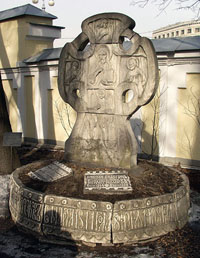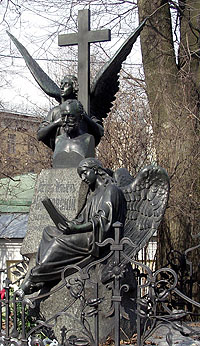What a collection of graves that is located in the Tikhvin Cemetery of the Aleksandr Nevskii Lavra in St. Petersburg. These are probably most of Russia's greatest musicians (Glinka, Rimskii-Korsakov, Balakirev, Mussorgskii, Chaikovskii, Borodin, Cui). Now I'm not exactly a classical music fanatic, but I still can offer a few remarks.
HIS 241
A Golden Age of Russian Culture
Remarks by Professor Evans
For a long time, most of Mussorgskii's works were mainly known in versions revised or completed by other composers, such as Rimskii-Korsakov. Mussorgskii suffered from alcoholism, and probably depression, and in early 1881 he declared that there was 'nothing left but begging' and suffered four seizures in rapid succession before dying. Probably his most famous work is St. John's Night on the Bare Mountain, which was made famous by its very bizarre appearance in Walt Disney's Fantasia (1940) with Leopold Stokowski directing.
Despite being largely self-trained, he was appointed to teach at the St. Petersburg Conservatory where he taught many future composers such as Aleksandr Glazunov, Sergei Prokofiev and Igor Stravinskii. Korsakov was an extremely prolific composer--most of his works I have never heard, including his fifteen operas--but his fame outside of Russia rests largely on his orchestral compositions, such as the Capriccio Espagnol and the the symphonic suite Scheherazade.
One of his conservatory students, Antonina Miliukova, began writing him passionate letters around the time that he had made up his mind to "marry whoever will have me." He didn't even remember her from his classes, but her letters were very persistent, and he hastily married her on July 18, 1877. Within days, while still on their honeymoon, he deeply regretted his decision. Two weeks after the wedding the composer attempted suicide by wading in a cold river. He later fled to Saint Petersburg a nervous wreck, and was separated from his wife after only six weeks. The couple never saw each other again, although they never divorced and Tchaikovsky died a married man. His widow died in an insane asylum 24 years later.
Nine days after the first performance of his Sixth Symphony (The "Pathétique") in 1893 in St. Petersburg, Chaikovskii died, most likely of cholera, although there is some dispute about that.
No doubt about, Chaikovskii was one of the world's great composer:
- Three great ballets, including Swan Lake (Op. 20, 1875-1876), Sleeping Beauty (Op. 66, 1888-1889)--Chaikovskii considered this one of his best works--and The Nutcracker (Op. 71, 1891-1892)
- Ten operas, the most famous being Evgenii Onegin, based on the Pushkin work; also The Queen of Spades (another Pushkin story)
- Six symphonies, the latter three (the fourth, fifth and sixth) are truly great
- Other stuff, including the 1812 Overture (Op. 49, 1880) which was written by Chaikovskii to commemorate the Russian victory over Napoleon in 1812. With all of its overt and triumphant Russian nationalism, Chaikovskii never really liked it. It is one of my pet peeves that somehow Americans always play this on the Fourth of July and other national celebrations when it is a work of Russian celebration not American. Please play the Stars and Stripes Forever or some other American marches on the Fourth of July.
The Russian "Golden Age" began roughly in the 1860s and peaked in the 1870s--there is some wiggle room with the dates. During this time, there were some spectacular achievements in the realm of Russian culture, for example, in literature, painting, music and the arts in general.
In music, the "Могучая кучка" (Moguchaia Kuchka, the "Five, the "Mighty Handful," or the "Mighty Five"), so named by the Russian critic Vladimir Stasov (1824-1906) in 1867, were the principal composers trying to establish a Russian identity to their music. This creation of a "Russian" identity was also taking place in the art world with the Peredvizhniki and in literature through the works of Turgenev, Dostoevskii and Tolstoi. While this was, on one hand, an attempt to pioneer a "Russian" artistic expression in these cultural fields, the works of all of these artists were just as good--probably better--than anything being produced in the world at that time. In other words, Dostoevskii, Chaikovskii and Il'ia Repin were not just "Russian" artists, they were "artists" (no national adjective needed).
But the Golden Age slowly began to disperse through the 1870s and then into the 1880s. The literary age ended with the deaths of Turgenev in 1883 and Dostoevskii in 1881 and the publication of Tolstoi's Confession in 1884. Music continued a bit longer into the 1890s but without Borodin and Mussorgskii and then Chaikovskii (1893).
Some recommended books
- Joseph Frank, Dostoevsky, 5 vols. (1976-2002)
- Walter Moss, Russia in the Age of Alexander II, Tolstoy and Dostoevsky (2002)
- Lev Tolstoi, Death of Ivan Ilich (1882)
- Lev Tolstoi, Resurrection (1889-1899)
- Lev Tolstoi, What is Art? (1896-98)
- David Brown, et al, Russian Masters, volume 1 (1986)
- Elizabeth Valkenier, Ilya Repin and the World of Russian Art (1990)
- Victor Terras, A History of Russian Literature (1991)
- Yelena Nesterova, The Itinerants: The Masters of Russian Realism (1996)
Some recommended Russian art websites
- Russian Painting
- Russian art
- Russian Art
- The State Hermitage Museum
- Lili Brochetain Art Collection
- Pushkin Museum of Fine Arts
- Treasure of the Czars
- Tretiakov Gallery
- Russian Art & Architecture
- Arkhip Ivanovich Kuinji
- Aristarkh Lentulov (1882-1943)
- Dmitry Levitsky (1735-1822),
- Kuzma Sergeevich Petrov-Vodkin (1878-1939)
- Ivan Shishkin
- Victor Vasnetsov
Some recommended Russian music websites
- Classical Music in Russia
- Russian Music,
- Alexander Borodin
- Mikhail Ivanovich Glinka
- Modest Petrovich Mussorgsky
- Modest Mussorgsky (1839-1881)
- Mussorgsky: Pictures at an Exhibition
- List of Compositions by Mussorgsky
- The Rimsky-Korsakov Home Page
- Pictures of Rimsky
- Rimsky-Korsakov’s Operas
- Peter Illich Tchaikovsky
Some recommended Russian literature websites
- Dostoevsky
- Dostoevskii bibliography
- Fyodor Mikhailovich Dostoevsky (1821--1881) An Index to Online Great Books in English Translation
- Notes from the Underground, Fyodor Dostoevsky
- Tolstoy, Leo Nikolayevich (1828-1910)
- Yasnaya Poliana
- Leo Tolstoy
- Tolstoy's The Cossacks
- Tolstoy Library
- Leo Tolstoy
- Tolstoy Timeline
- Yasnaya Poliana Pictures
- Ivan Turgenev
- Bezhin Meadow by Ivan Turgenev






